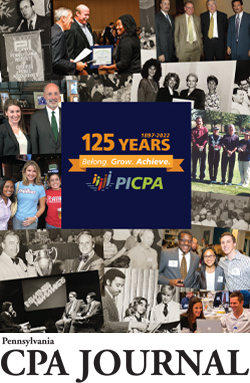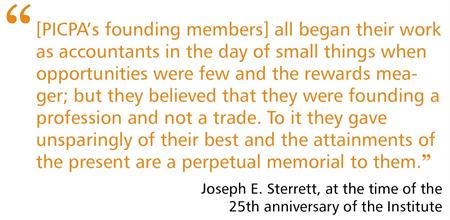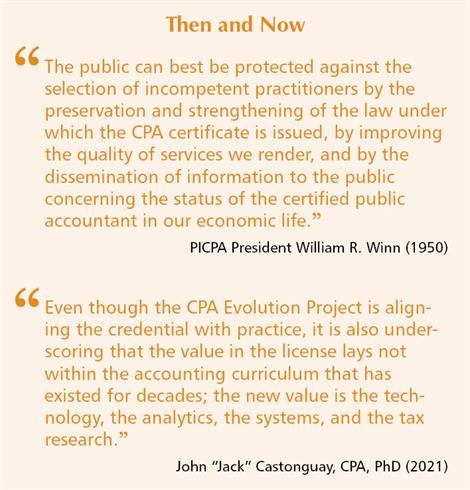PICPA at 125 Years: Celebrating an Enduring Legacy, Building an Exciting Future
On our 125th anniversary, the PICPA would like to share a few highlights from the past and some of our plans for how we will continue coming together to enhance the profession, serve the public, and work together to resolve common issues, big and small. Specifically, this feature looks at our membership, advocacy efforts, professional learning channels, the pipeline of new CPAs, and the profession’s reputation and ethics.
by Matthew McCann Jun 8, 2022, 18:21 PM
 The NFL is 107 years old. Ford is 119. Pepsi is 124. The PICPA has served its members, grown, and adapted for longer than all of them. On our 125th anniversary, the PICPA would like to share a few highlights from the past and some of our plans for how we will continue coming together to enhance the profession, serve the public, and work together to resolve common issues, big and small.
The NFL is 107 years old. Ford is 119. Pepsi is 124. The PICPA has served its members, grown, and adapted for longer than all of them. On our 125th anniversary, the PICPA would like to share a few highlights from the past and some of our plans for how we will continue coming together to enhance the profession, serve the public, and work together to resolve common issues, big and small.
Specifically, this feature looks at our membership, advocacy efforts, professional learning channels, the pipeline of new CPAs, and the profession’s reputation and ethics. These are the sources of PICPA’s historical values and the basis upon which we will continue to grow and support Pennsylvania CPAs as they navigate a changing landscape into the future.
Members and Their Expertise
The institute was founded March 30, 1897, and for the first three years of its existence it was named the Pennsylvania Association of Public Accountants. The name changed to the Pennsylvania Institute of Certified Public Accountants on Oct. 15, 1900, after passage of Pennsylvania’s first CPA legislation. The inaugural officers were John Heins (president), Joseph E. Sterrett (secretary), and William M. Lybrand (treasurer).
Two seminal events during PICPA’s early years may have had a profound effect on the CPA profession and a growth in our membership: passage of the 16th Amendment to the U.S. Constitution instituting federal income taxes (1913) and the Great Depression (1929-1940). With the growth and importance of tax work among businesses and individuals, PICPA membership doubled in size from 1910-1920. Likewise with the Great Depression, so much in the national economy and government involvement changed. The public demanded government oversight, and regulators turned to the honor and abilities of CPAs. Nearly 600 CPA licenses were issued in Pennsylvania between 1930 and 1940, nearly doubling the total issued at the time. By March 1947 (the 50th anniversary of the PICPA), membership was over 1,000. Seventy-five years later, on our 125th birthday, membership exceeds 20,000.

With its growth in members and its responsibilities to them, the PICPA hired its first full-time executive director in 1952 to help shoulder the load: F. Willard Heintzelman, CPA. Before Heintzelman, the two members primarily responsible for leading the organization were Joseph E. Sterrett and Robert J. Bennett. The three most recent PICPA executives are Albert E. Trexler (1977-2011); Michael D. Colgan (2011-2021); and Jennifer Cryder, CPA (current). Cryder is the first woman to be named PICPA CEO. Other female firsts at the PICPA include Susan E.S. Howe, PICPA’s first female president (2004), and Mary B. Niles, the first woman CPA in Pennsylvania and a PICPA member, who received her certified public accountant certificate in 1900.
According to AICPA’s recent 2021 Trends report, the number of women CPAs serving in accounting/finance functions in firms was 46% in 2020; in 1989, the percentage of female auditors and accountants was at 38%. The profession is working hard on overall diversity, including ethnicity and sexual orientation in addition to gender. The profession now reports roughly 23% people of color among the ranks of CPAs. In 2015, Julius Green became the first African American to be elected PICPA president. Barriers are being lowered and a new focus is driving these inclusion efforts. We look forward to reporting significant progress in the coming years thanks to efforts being led by PICPA’s Diversity, Equity, and Inclusion Committee.
PICPA membership is professionally diverse as well. While much of our membership is in public accounting (47%), we also have 35% in corporate positions, and 3% in education and nonprofit. The PICPA has been working above and beyond over the past 20 years or so to add value for our very important corporate CPA members. Truly, the finance function in corporations has transformed from compiling data to analyzing it and offering solutions. To address these changing circumstances, the PICPA has established conferences for CFOs and controllers, business and industry columns in the Pennsylvania CPA Journal, and corporate roundtables for discussions between peers. Educator CPAs are on the front lines, both sharing with us what they are seeing among students and asking for input on what firms need from their young professionals. This has been a brilliant exchange for decades, but an “Evolution” is coming. As discussed below in the Bringing the Next Generation Forward section, the CPA Evolution project will help ensure CPAs keep pace with the world they serve, and the PICPA is going to be right there to help our educator members apply this vision.
Working with Government
Today, the PICPA is hard at work championing Pennsylvania House Bill 1328, which will modernize and update the Pennsylvania CPA Law. This bill would require the Pennsylvania State Board of Accountancy to adopt a nationally recognized Code of Professional Conduct, a change that would standardize the principles, rules, and interpretations that guide CPAs in the performance of their professional responsibilities, eliminating the need for continuous state-level statutory updates related to the professional conduct. It also makes changes to the CPA Law’s peer review provisions, which have not been substantially amended since they were adopted in 1997. The bill also expands the scope of courses students can take that count toward the 150-hour requirement for licensure and changes the law to allow students to sit for the exam with 120 credit hours of education, without a degree being conferred. This will help Pennsylvania remain competitive with surrounding states and ensure candidates don’t go to other states to become licensed.
This is not the first time the PICPA has pushed for legislation to benefit the profession. In fact, it is our origin story.
Upon formation, the institute’s original leadership drafted a proposed CPA bill and brought it to Harrisburg in April 1897. There was no recognized CPA credential in Pennsylvania at this point. As you can see, advocacy was at PICPA’s core from the very beginning. It took a few years, but the push for a CPA bill eventually succeeded in March 1899. Among other things, it stipulated that a state-sanctioned exam was required for licensing and established a state board of examiners to oversee the profession.

The PICPA, over the years, would reengage with legislators to update the laws governing the profession and the high expectations for entrants. Sometimes the effort was Pennsylvania-specific, other times the engagement was on behalf of a more national effort. For example, the Amended Uniform Accountancy Act included “substantially equivalent” criteria that allowed for the first time a CPA with a valid license in one state to practice across state lines. Part of achieving this included acceptance of substantial equivalency among those states requiring the “three E’s” – examination (passage of the Uniform CPA Examination), experience (the one-year experience requirement), and education (the 150-hour education requirement).
Working with government hasn’t been limited to working on licensing issues. Not by a long shot. Our members serving on government and tax committees and our government relations team regularly hold Q&A sessions with the Pennsylvania Department of Revenue, lobby legislators on vital tax and business legislation – often through our all-important political action committee (CPA-PAC) – and meet with governmental power brokers, as highlighted by our recent Q&A with Gov. Tom Wolf. Our partnership with the Department of Revenue, in particular, has become a vital resource for members, providing answers to unclear tax positions and direct access to the decision-makers.
These vital efforts grew more complex over the years, and that is why the PICPA opened its Harrisburg government relations office in 1979. The government relations team has had many great successes over the years. One in particular, Act 32 of 2008, greatly reformed Pennsylvania’s Byzantine local earned income tax system by establishing new – and many fewer – tax collection districts.
Advocating for our members never takes a break. As this issue went to press, PICPA is informing policy and educating legislators on a potential reduction of the state corporate net income tax and is advocating for an elective pass-through entity tax and bonus depreciation solution.
Gathering and Applying Our Expertise
Technology is taking CPAs down new paths, and PICPA members are challenging themselves by evaluating the potential of real-time auditing through advanced computing, the dual aspects of data analysis and data security, and the skills adjustments that may be necessary among future CPAs.
Gathering and applying technology skills may not have been an initial consideration of PICPA’s founders, but it is part of the CPA fabric today. Technological expertise, professional acumen, and communicating shared experiences have all become inseparable for CPAs and PICPA members.
At PICPA’s 125-year mark, CPAs are working with sophisticated systems and tools, like machine learning, artificial intelligence, and robotic process automation to reinvent the roles that accountants play in firms and companies. While CPAs have embraced technology for decades, it is more important than ever to increase skills and knowledge in this critical area.
Early forays into professional education got off the ground in 1904 with evening accountancy classes to help prepare prospective CPAs for the licensing exam, well before there were continuing education requirements. Over the years, the PICPA enhanced its education offerings, which soon became a major source of value to members. Today, the PICPA operates CPA Crossings, a national CPE webinar provider. The institute purchased CPA Crossings in 2020 and has greatly expanded CPE content for members and nonmembers over the years.
PICPA’s first tax conference was in November 1964 in Harrisburg. There have been many different tax conferences over the years, which have now coalesced at PICPA’s 125-year mark as Tax Con. Held in November, this two-day conference covers every angle on tax compliance and consulting, including Pennsylvania, federal, local, multistate, and international tax topics. The PICPA hosts at least a dozen conferences every year, specifically geared for CPAs of all levels to grow their professional acumen and become indispensable contributors within their organizations.
Sharing experiences, tips, and guidance is what makes the PICPA community so strong. Initial information sharing was through a professional journal (The Public Accountant) first published in October 1899. The sharing of professional knowledge and providing technical resources has continued to evolve over the years. Here is a look at PICPA’s different information media:
- Yearbooks (1911-1927 annual, then sporadic)
- The Spokesman (1931-1953)
- Pennsylvania CPA Spokesman (1953-1983)
- Pennsylvania CPA Journal (1983-present)
- Email news briefs, blogs (CPA Now), social media (present)
In an exciting new endeavor, we are building PICPA Insights, a new project that will provide practical solutions to rapidly changing issues. Cutting-edge topics will be addressed through research reports, subject matter expertise analysis, workshops, and additional novel outputs.
Bringing the Next Generation Forward
The PICPA has been providing financial assistance to students for well over 80 years. PICPA’s Scholarship Fund was established back in 1938, but in April 2017 a bolder, bigger, and more ambitious program grew out of the old Scholarship Fund: The Pennsylvania CPA Foundation. Under the guidance of Mike Colgan, former PICPA executive director, the Foundation was established to provide motivational, educational, and financial support to those working to attain the CPA credential. Activities include education to prospective and aspiring CPAs, additional support for disadvantaged populations to pursue CPA careers, and ensuring that a strong and diverse pipeline of talent will support the future of the profession and continue to protect the public interest. Since it’s founding, the Foundation has awarded $722,200 in scholarships, eclipsing all of the monies raised for scholarships in the first 60 years of the Scholarship Fund’s existence, and provided access to the profession to hundreds of future CPAs.
In the earliest days, a CPA needed only a high school degree and some preparatory classes to take Pennsylvania’s CPA licensing exam. As the sophistication of the profession has advanced through the decades, so did the baseline requirements for entry, and the PICPA has been there along the way to make sure the pipeline of CPAs in Pennsylvania continues to flow. Today, CPA Evolution, an initiative jointly created by the AICPA and the National Association of State Boards of Accountancy, is modernizing the CPA licensure model to recognize the rapidly changing skills and competencies the practice of accounting requires today and will require in the future. We’ve helped facilitate input from practitioners and educators to help ensure exam changes reflect what is being required of newly licensed CPAs. The PICPA is keeping members, students, and their professors updated through blogs and journal articles, and will provide more detailed resources as the CPA Evolution initiative comes closer to fruition.
Professional Reputation, Ethics, and Peer Review
The CPA profession’s enduring trustworthiness often goes hand-in-hand with ethics and peer review.
In the 1950s, CPAs began to stake a claim on the stellar reputation they had built over the previous decades. In January 1955, rules went into effect establishing professional conduct expectations. But this wasn’t the first act to maintaining the profession’s integrity, nor would it be the last.
There was a surge in the number of CPAs entering the profession after World War II, and with an eye toward avoiding the fiscal irresponsibility that wreaked havoc for a decade in the 1930s, PICPA’s Committee on Education began a review of the requisites that make for a good CPA. The committee identified three foundational areas: character and aptitude, educational training, and practical training and experience. To maintain these core areas, the PICPA worked in 1947 to repeal and replace the original 1899 state CPA law with a new Certified Public Accounting Act. The law expanded the powers of the state board of examiners, provided for a fully written CPA licensing exam, and established enhanced work experience requirements.

CPAs continue to remind businesses that it is to their advantage to embrace the sophisticated skills of CPAs. In 1967, future PICPA president John L. Harvey helped prepare a series of television programs titled, “How to Use Accounting as a Managerial Tool,” and quite a few members on the corporate side have strongly advocated recently in the Pennsylvania CPA Journal and CPA Now blogs that CPAs should be a part of the strategic business-decision-making process in the C-suite. The skill sets of corporate CPAs have grown so much over the years that the work produced by CFOs is much more than managerial tools and should be a part of sophisticated business decisions.
To build on the integrity of the profession, in December 1976 Pennsylvania became the 23rd state to enact continuing education requirements for CPAs. In the 1980s, AICPA’s Code of Professional Conduct was revised and PICPA’s peer review was created. Our peer review team and member reviewers excelled at this oversight so well that PICPA now administers peer reviews for firms in Pennsylvania, New York, Delaware, and U.S. Virgin Islands.
The Path Forward
In addition to what was mentioned in this article, CPAs will continue to witness more accounting firm mergers, changes to the corporate finance function, widespread incorporation of AI and data analytics for public and corporate accounting, more tax reform, increased focus on driving talent into the profession, and a greater emphasis on measuring and reporting on environmental, social, and governance (ESG) practices. The next 25 years will undoubtedly yield rapid change, and the PICPA will work closely with our members and external experts to address these issues, come up with paths forward, and provide the resources necessary to help CPAs succeed. Because this is what we have always done and will continue to do. As our vision statement makes clear, PICPA is dedicated to solving problems and creating opportunities for CPAs, building solutions that our members will need for tomorrow while also serving the needs of today. The PICPA will be future-focused, and will continue to focus on collaboration, partnership, and agility as critical ingredients to future success.
What does your crystal ball see for the next 25 years for the CPA profession and the PICPA? Email journal@picpa.org, and we may share your thoughts in a future issue, our website, or maybe even in the institute’s 150th anniversary coverage in 2047.
Matthew McCann is publications and content editor for the PICPA. He can be reached at mmccann@picpa.org.


Leave a commentOrder by
Newest on top Oldest on top